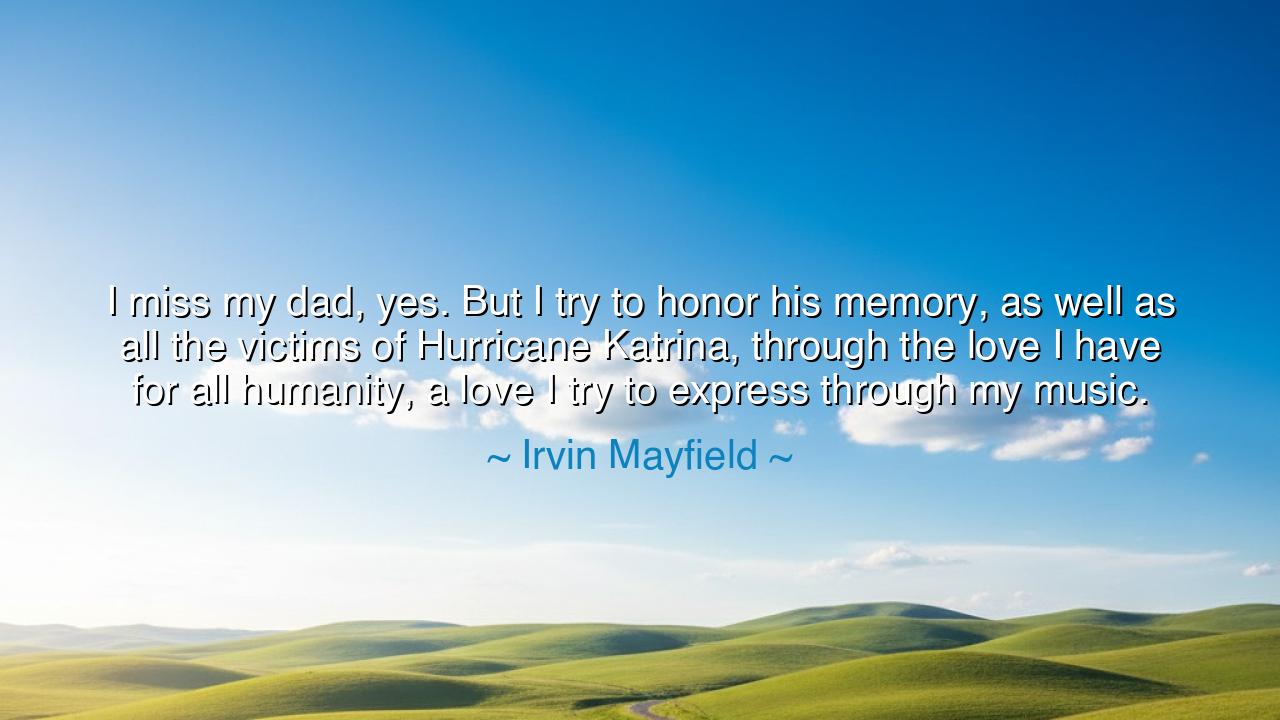
I miss my dad, yes. But I try to honor his memory, as well as all
I miss my dad, yes. But I try to honor his memory, as well as all the victims of Hurricane Katrina, through the love I have for all humanity, a love I try to express through my music.






In the words of Irvin Mayfield, “I miss my dad, yes. But I try to honor his memory, as well as all the victims of Hurricane Katrina, through the love I have for all humanity, a love I try to express through my music.” These words flow not merely as a confession of grief, but as a hymn of transformation — a sacred turning of sorrow into creation, of memory into melody, of pain into purpose. Within them lives the ancient truth that love is the only force strong enough to redeem suffering. Where others might have drowned in despair, Mayfield chose to raise a song — and through it, to heal not only himself, but the world around him.
The origin of this quote is rooted in tragedy and endurance. Irvin Mayfield, the celebrated jazz trumpeter from New Orleans, lost his father to the merciless floodwaters of Hurricane Katrina in 2005. The storm, one of the most devastating in American history, did not simply destroy homes — it tore apart the soul of a city, a culture, and a people. For Mayfield, the loss was deeply personal, yet it became something greater. Instead of yielding to bitterness, he sought to honor his father’s memory and the memory of thousands of others who perished, not by silence, but by sound. His music became an act of remembrance — a living prayer, a bridge between grief and grace.
In the ancient world, the poets understood this power well. The bards of Greece, the griots of Africa, the shamans of forgotten tribes — all knew that art is remembrance, that every note and word can carry the weight of the dead into the hearts of the living. So too did Mayfield take up his trumpet as one might take up a torch, carrying light through darkness. He did not deny his pain; he transformed it. The love he expresses through music is not sentimental, but sacrificial — the kind of love that costs something, that demands courage, that insists life must continue even when hearts are broken.
His act of remembrance is also an act of universal compassion. “A love I have for all humanity,” he says — and this is the soul of the message. For true love of humanity does not arise in comfort, but in suffering. Those who have lost deeply are often those who can love most widely, for they understand the fragility of every life. In his grief, Mayfield does not seek revenge against fate or nature; instead, he turns outward, giving what he can — the gift of music, the gift of empathy. This is a love that transcends race, place, and history — a love born of pain, but purified by purpose.
Let us look to history for its echo. When Ludwig van Beethoven went deaf, he too faced despair beyond measure. For a musician to lose his hearing is to be exiled from his own art. Yet rather than surrender, Beethoven turned inward and discovered a deeper music — the music of the spirit. From his silence came symphonies that still stir the hearts of mankind. Like Mayfield, Beethoven turned suffering into creation, isolation into communion. Both men teach the same immortal truth: that art can transform agony into beauty, and through beauty, restore the world to hope.
The lesson in Mayfield’s words is clear — that grief, when embraced with courage, can become love; and love, when expressed with sincerity, becomes healing. Every soul will face loss, but not every soul will rise from it. To rise, one must find a way to serve — to turn memory into motion, pain into purpose. Whether through music, or kindness, or silent acts of compassion, we each have the power to honor the dead by how we live. Love, when given freely, redeems the weight of sorrow.
So, children of time, when you too are visited by loss, remember Irvin Mayfield’s path. Do not drown in your tears — let them water the soil from which your love may bloom. Speak the names of those you have lost, not in despair, but in gratitude. Create, build, give, and serve. For the highest tribute to those who are gone is not mourning, but meaning. Let your life itself become a song — a song of remembrance, of healing, of hope.
And in that song, the dead shall never truly die. Through the love you have for all humanity, they will live again — not as ghosts in sorrow, but as light in the hearts of those you touch. This is the legacy of Irvin Mayfield, the trumpeter of New Orleans — a man who turned the ruins of a storm into a cathedral of sound, and who proved, by his own example, that even amidst loss, love remains the truest music of the soul.






AAdministratorAdministrator
Welcome, honored guests. Please leave a comment, we will respond soon